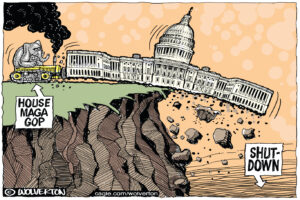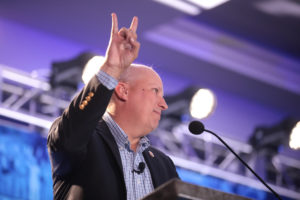Uncompassionate Conservative
The president's proposed cuts in children's health insurance are so shameful that even Bush's treasury secretary appeared to distance himself from them.WASHINGTON — It was one of those moments when a public official gives away a larger truth by offering what seems to be a throwaway line.
Testifying earlier this week on President Bush’s budget, Treasury Secretary Henry M. Paulson Jr. suggested he would not mind a bit if the Democratic Congress added money to prevent cutbacks in coverage under the federal government’s children’s health insurance program.
“It just may be,” Paulson said mildly, “that the Congress believes that that’s something that should be funded at a higher level.”
In other words, Bush’s budget is a collection of artificial numbers — including cuts in domestic programs Congress will inevitably reverse — that allow the president to claim fiscal responsibility while demanding that his tax cuts for the wealthy be made permanent.
The cutbacks in health insurance coverage for lower-income working families are among the most egregious of the president’s fiscal choices. And it’s not just Democrats who are saying so.
“These cuts interfere with the fundamental responsibility of government: to safeguard the lives of its citizens,” said Gov. M. Jodi Rell of Connecticut, a member of that small, hardy group of Northeastern Republicans to survive last November’s Democratic tide.
“Whether we are helping struggling families stay warm through the harsh winter months or protecting homes and residents against terrorism and natural disasters, we expect our federal partners to carry their fair share,” she said. “The cuts to these programs place extraordinary burdens on the states.”
Or consider the response of the Rev. Larry Snyder, president of Catholic Charities USA. “The president’s new budget,” he said, “hurts those living in poverty at a time when we should be doing even more to help the most vulnerable among us.”
You’d think Bush would understand this since he regularly praises faith-based groups and long ago touted himself as a compassionate conservative. After all, the president made big news last week when he finally acknowledged what has been close to unmentionable in his administration. “The fact is,” he said, “that income inequality is real.” Facts, as Ronald Reagan once observed, are stubborn things.
But this is a budget destined to make income inequality much worse. The liberal Center on Budget and Policy Priorities has created a chart that should be a centerpiece of all discussions concerning Bush’s accounting.
The center examined what the White House’s proposals would mean in 2012, the magical year when Bush — with much flimflam — claims his plan will produce a budget surplus. It found that if enacted, the president’s budget would lead that year to $73 billion in tax cuts for households with annual incomes of over $1 million and $34 billion in cuts in domestic discretionary programs, many of them benefiting Americans of low and middle income.
So here is a president who believes passionately in redistributing income — upward.
As Rell suggested, there are plenty of problems with Bush’s budget, and with Republican governors complaining (Rell is not alone), even members of Congress from the president’s own party will quietly turn their backs on parts of his plan.
But the most shameful move may be the poorly disguised reduction in SCHIP, the program for working families with kids whose households earn too much to qualify for Medicaid but too little to afford private coverage — exactly the sorts of hardworking citizens welfare reformers claim to love.
At a time when so many Americans are losing private medical insurance, the SCHIP program — originally passed in 1997 with strong bipartisan support — is one of the few government efforts working against that dangerous health trend.
The program now covers 6 million children in the course of a year. A president who cared about inequality would presumably be proposing to expand the program to cover the remaining 6 million lower-income children who still lack health coverage. At modest cost and in a rather simple way, Bush could get credit for taking a measured but significant step toward universal coverage.
Instead, Bush proposes what’s called an increase in SCHIP funding of $4.2 billion over five years that has the practical effect of cutting into the number of kids covered. Sen. Max Baucus, D-Mont., the Finance Committee chairman and no flaming liberal, has estimated it would take $15 billion over that period just to maintain current coverage levels.
The president is far more committed to cutting taxes on Paulson’s old Wall Street pals than to getting health coverage to kids with low-wage working parents. It’s to Paulson’s credit that, from his words at least, he appeared to be embarrassed. Clearly Bush isn’t.
E.J. Dionne Jr.’s e-mail address is postchat(at symbol)aol.com.
Your support matters…Independent journalism is under threat and overshadowed by heavily funded mainstream media.
You can help level the playing field. Become a member.
Your tax-deductible contribution keeps us digging beneath the headlines to give you thought-provoking, investigative reporting and analysis that unearths what's really happening- without compromise.
Give today to support our courageous, independent journalists.









You need to be a supporter to comment.
There are currently no responses to this article.
Be the first to respond.